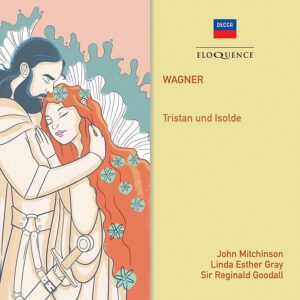The title of Alice Cooper’s 1971 album “Love It to Death” all too often applied to Reginald Goodall’s conducting of Wagner. He favored slow tempos that allowed him to bask in detail and thematic connections, yet all too often yielded rhythmically enervated and dramatically amorphous results, as his live English-language Ring Cycle and Mastersingers bear out, not to mention his live and studio Parsifal recordings. The grand exception, however, is Goodall’s 1980/81 Welsh National Opera studio Tristan und Isolde, where the conductor’s deliberation and the music’s chromatic unrest triumphantly fuse to create a consistent state of tension and release.
The painstakingly calibrated yet sustained phrasing in the Act 1 and 3 Preludes bears this out, as well as Act 1’s long instrumental passage covering the protagonists’ drinking of the love potion. More importantly, Goodall’s singers go with the unpressured flow rather than struggle against it. As a consequence, Linda Esther Gray has plenty of room for Isolde’s Narrative and Curse not only to take wing but to build to its high-B climax without pushing. She and her Tristan, tenor John Mitchinson, achieve arresting musical and theatrical synchronicity in the Act 2 Love Duet, abetted by Goodall’s assiduous tempo relationships and Anne Wilkens’ hauntingly floating rendition of Brangäne’s warning midway.
All too often King Marke’s monologue threatens to stop the action in its tracks, yet Gwynne Howell creates an interior monologue full of subtle word coloring and dynamic shading. One pleasant surprise upon rehearing this recording was the young Philip Joll’s energetic and ever-present portrayal of Tristan’s faithful squire/sidekick Kurwenal.
Decca’s sonics convey a genuine concert hall ambience minus the stridency and glare often heard in the label’s early digital productions (i.e., the Solti Flying Dutchman, the Mehta Symphony fantastique). The booklet notes offer an essay about the music by William Mann, but no particulars about this specific recording, and no texts nor translations. Still, one must thank Eloquence for making this performance available again; it’s a fascinating and compelling antipode to Karl Böhm’s reference version.
































